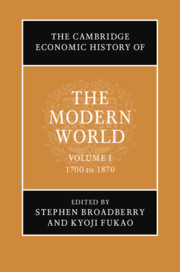Book contents
- The Cambridge Economic History of the Modern World
- The Cambridge Economic History of the Modern World
- The Cambridge Economic History of the Modern World
- Copyright page
- Contents
- Figures
- Tables
- Contributors to Volume I
- Preface and Acknowledgements
- Introduction to Volume I
- Part I Regional Developments
- Part II Factors Governing Differential Outcomes in the Global Economy
- 12 Population and Human Development since 1700
- 13 Proximate Sources of Growth: Capital and Technology, 1700–1870
- 14 Underlying Sources of Growth: First and Second Nature Geography
- 15 Institutions
- 16 Consequences of Growth: Living Standards and Inequality
- 17 International Transactions: Real Trade and Factor Flows
- 18 Monetary Systems and the Global Balance of Payments Adjustment in the Pre-Gold Standard Period, 1700–1870
- 19 War and Empire, 1700–1870
- Index
- References
15 - Institutions
from Part II - Factors Governing Differential Outcomes in the Global Economy
Published online by Cambridge University Press: 03 June 2021
- The Cambridge Economic History of the Modern World
- The Cambridge Economic History of the Modern World
- The Cambridge Economic History of the Modern World
- Copyright page
- Contents
- Figures
- Tables
- Contributors to Volume I
- Preface and Acknowledgements
- Introduction to Volume I
- Part I Regional Developments
- Part II Factors Governing Differential Outcomes in the Global Economy
- 12 Population and Human Development since 1700
- 13 Proximate Sources of Growth: Capital and Technology, 1700–1870
- 14 Underlying Sources of Growth: First and Second Nature Geography
- 15 Institutions
- 16 Consequences of Growth: Living Standards and Inequality
- 17 International Transactions: Real Trade and Factor Flows
- 18 Monetary Systems and the Global Balance of Payments Adjustment in the Pre-Gold Standard Period, 1700–1870
- 19 War and Empire, 1700–1870
- Index
- References
Summary
A basic framework for classifying institutions and thinking about their role in economic development is illustrated with the colonial experience of the British and Spanish empires in the eighteenth and nineteenth centuries, and Japan in the nineteenth century. Institutions are the ‘rules of the game’. Primary rules are rules that apply directly to individuals and their relationships. Secondary rules are the ‘rules for making the rules’. The secondary rules governing the Spanish Empire located the procedures for making new rules and changing existing rules in negotiations with the king. Secondary rules in the British Empire located many of the processes for making new rules in the colonies themselves. Faced with independence and the end of monarchical rule in the late eighteenth and early ninteenth century, the institutions in the former Spanish colonies had to be reinvented from whole cloth, as the basic structure of secondary rules was no longer viable. In the British North American colonies, secondary rules allocating authority to colonial legislatures remained in place and were gradually transformed after independence. Japan, in contrast, wrestled with how to structure secondary rules in the events leading up to and following the Meiji Restoration.
Keywords
- Type
- Chapter
- Information
- The Cambridge Economic History of the Modern World , pp. 369 - 390Publisher: Cambridge University PressPrint publication year: 2021

